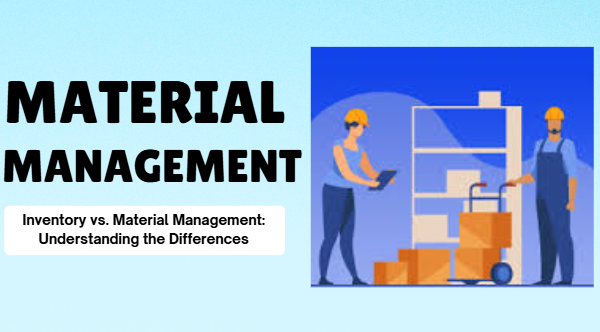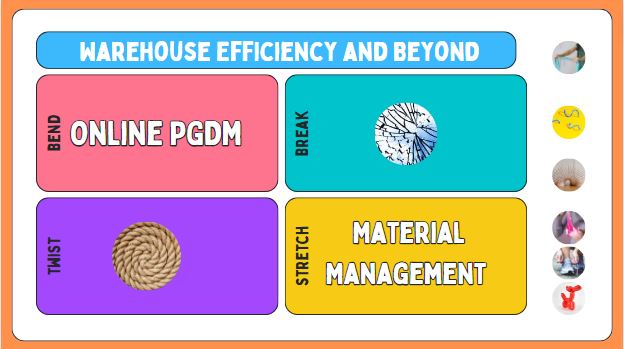
Within the rapidly evolving supply chain and logistics realm, the phrases “material management” and “inventory management” are sometimes used interchangeably. However, they pertain to various processes that are essential to organizational success. Understanding these differences is especially important for professionals pursuing postgraduate degrees, such as a PGDM in Material Management or other specialized programs. Let’s look at the subtleties of these notions and their consequences for the corporate world.
What is Inventory Management?
Inventory management is concerned with controlling stock levels, including raw materials, work-in-progress products, and finished commodities. It guarantees that an organization has the proper inventory to meet client demand without overstocking or understocking. Inventory management requires the following key responsibilities:
- Stock Monitoring: Tracking the amount and state of goods in storage is known as stock monitoring.
- Order Fulfillment: Ensuring that products are available to clients on time or in production.
- Demand forecasting: It is the use of previous data to predict future stock requirements.
- Cost Control: Reducing the costs of holding and managing inventory.
Professionals who want to flourish in this field might benefit from the top PG Diploma in Material Management, which frequently includes modern inventory control tactics and technology.
What is Material Management?
Material management, however, adopts a more comprehensive perspective. It includes the planning, procurement, handling, and application of materials required for production and operation. The goal of this procedure is to guarantee that resources go smoothly from suppliers to manufacturers to distribution. Important duties in material management include:
- Procurement: Procurement is the process of sourcing and purchasing products at the best possible price and quality.
- Storage: Effective management of warehouses and storage facilities.
- Logistics Coordination: Ensuring the smooth movement of materials.
- Supplier Relationship Management: It entails forming strong ties with vendors for long-term benefits.
Individuals seeking to acquire these abilities can benefit from enrolling in the best PG Diploma in Material Management or Material Management courses, which can provide essential insights into best practices and current trends.
Core Differences Between Inventory and Material Management
Both procedures are essential to operational effectiveness, although they have somewhat different goals and areas of focus:
Scope of Activities:
- Inventory management is a subcategory of material management that deals mostly with stock control.
- Material management encompasses procurement, logistics, and supplier relations.
Objective:
- Inventory management seeks to maintain stock levels to fulfill demand while minimizing expenses.
- The overall flow of materials is the main emphasis of material management, which supports production and business continuity.
Responsibility:
- Inventory managers are worried about quantity and storage.
- Material managers oversee whole processes, from sourcing to delivery.
Strategic vs. Operational:
- Inventory management deals with daily stock levels and is more operational.
- Material management is a strategic process that aligns material flows with organizational goals.
Why Understanding the Difference Matters
Understanding the difference between these two regions is critical for people looking to improve supply chain systems. Businesses frequently face inefficiencies due to a lack of clear separation between inventory and material management. Poor material planning, for example, can result in stockouts, whilst over-dependence on inventory can raise holding costs.
This is when further education is useful, such as in a Material Management PGDM course. Professionals who learn in-depth knowledge can close gaps, streamline procedures, and improve overall efficiency.
Benefits of Advanced Education in Material Management
Enrolling in the best Material Management courses or pursuing a PGDM in Material Management course provides various benefits, including:
- Improved Career Opportunities: Positions like supply chain manager, procurement specialist, and logistics coordinator become available to those with specialized knowledge.
- Strategic Insights: The courses teach students how to think strategically to optimize material and inventory flows.
- Technical Proficiency: Having experience with contemporary equipment and software for material and inventory management.
- Relevance to Industry: The top PG Diploma in Material Management program’s curriculum is in line with what the industry needs right now, guaranteeing real-world application.
Conclusion
Material management and inventory management are two sides of the same coin that each have different but complimentary roles in the supply chain. Inventory management focuses on stock levels, whereas material management assures the smooth movement of resources across the company.
The top Material Management courses or the PGDM course in Material Management are examples of specialist programs that professionals hoping to establish themselves in these fields should think about enrolling in. These programs teach the knowledge and skills required to succeed in today’s competitive business climate. Individuals who master these skills can make a substantial contribution to company performance and establish themselves as vital assets in the supply chain and logistics fields.




